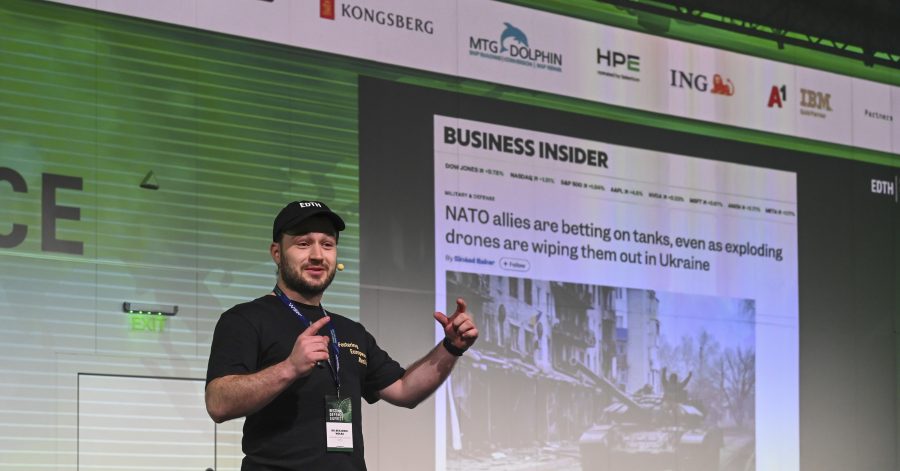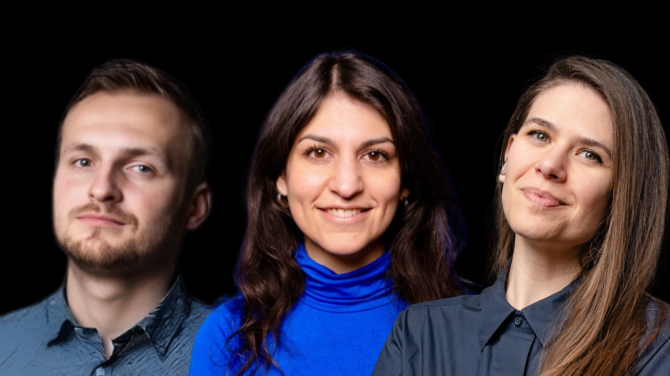In a few years, Ukraine’s wartime economy has shifted toward large-scale technological production. According to the country’s commander-in-chief, more than 1.3 million drones were delivered to soldiers in 2024. By 2025, output is expected to exceed 4.5 million units, while the cycle of development and deployment becomes shorter.
This need of new technology is something that Benjamin Wolba, co-founder of European Defense Tech Hub, saw a gap, as well as an opportunity. As founder of the European Defense Tech Hub (EDTH), together with Jonatan H. Luther-Bergquist, he is building one of Europe’s fastest-growing ecosystems for defense innovation, bringing together hackers, engineers, students, and startups to tackle real-world challenges faced by soldiers on the battlefield.
Since launching in April 2024, EDTH’s hackathons have become a movement. “Pretty much from the beginning, we saw very strong results, both in terms of participants signing up and partner companies joining,” Wolba says. “Early on, we had Helsing as one of our first partners.”
Europe’s new defense startup scene
Wolba recalls the early days: “We were investing maybe 60 or 80 hours, if things went well, and in the end, we had 150 people outside, across 34 teams, working on topics like air defense or resilient communications through mesh networks. We even had Bulgarian high school students joining to work on demining, and eventually, they secured third place in the hackathon.”
He quickly realized the idea was bigger than a single event.
“I began to see its true potential, and how important it would be — on one hand, to help Ukraine win the war and defend itself, and on the other, to help Europe wake up, become more resilient, and address drone threats. We decided to keep going with a community. That’s why it’s the European Defense Tech Hub — not just one hackathon, but a lasting, organized initiative.”
By late 2024, the team had already organized hackathons in Munich, Copenhagen, and Paris, attracting participants from across Europe and Ukraine. “We had so much inbound that there was no question whether or how we should continue,” says Wolba. “We started organizing many more hackathons globally — plus drone building workshops, meetups, and other event formats to bring more talent into the defense tech industry.”
Each hackathon now produces 10 to 12 startups, and the EDTH team expects to support over 100 projects by the end of 2025, helping them launch, scale, and bring solutions to market.
How the hackathons work
The hackathons bring together people interested in defense innovation to collaborate on practical challenges. Participants, often students, researchers, or early-stage founders, work on problems faced by soldiers in Ukraine, NATO countries, and their allies.
“Our hackathons are special in two ways,” Wolba explains. “First, they focus on defense and national security, so we have strict security measures; we check IDs, have security personnel, and for obvious reasons, some nationals can’t attend. Second, most defense challenges require hardware — you can’t solve air defense without it. About 70–80% of projects involve physical components.”
Events begin on a Friday afternoon with workshops that are deliberately hands-on. “We learned that hackers don’t enjoy long panels or talks, they prefer to build. So we run workshops like building or flying FPV drones, first-aid training, or machine learning for defense applications. It gets people in the right mindset and helps teams form organically.”
Teams of two to five participants form and choose challenges prepared with partners such as Helsing, Quantum Systems, and Ukrainian institutions, including the Ministry of Defense, Snake Island Institute, and IRON Cluster. “All information we use is public, as we don’t deal with confidential data,” Wolba emphasizes. “The goal is to stay open and inclusive while remaining responsible.”
Participants have 48 hours to design, prototype, and test technologies such as AI surveillance tools and interceptor drones. “We’ve had teams build functioning prototypes overnight,” says Wolba. “They come up with all kinds of solutions — new algorithms to optimize flight paths, drones that can take off and land vertically. On Sunday, they submit a short presentation and a demo video.”
The weekend culminates in a Demo Day, where participants pitch their projects to a jury and invited guests. “There’s no cash prize,” Wolba explains. “The most important thing is that people continue after the hackathon. We want them to raise funding and build real products for the battlefield.”
Growing network of builders, mentors, and allies
EDTH’s support doesn’t stop when the hackathon ends. “We’re still early-stage ourselves,” says Wolba, “but we’re building resources — a talent pool for hiring, an investment network, and an online community with mentors and webinars. We’ve seen people return to multiple hackathons, developing their projects between events, and some have already founded real startups.”
He explained that defense is a complex field that requires proper guidance. To address this, Wolba said, they bring in mentors from tech companies, venture capital funds, government, the armed forces, and NGOs, usually 20 to 30 top-tier experts who volunteer their time.
One of their latest initiatives, which took place in Southeastern Europe for the first time, was a drone-building workshop in Sofia, Bulgaria, held during the Regional Defence Summit by Capital.bg and organized with the Drone Aid Collective, a Netherlands-based nonprofit.
“It’s not a hackathon but a hands-on workshop where participants build FPV drones using donated parts,” says Wolba. “It takes about two to three hours to assemble, and the finished drones are donated to Ukraine for humanitarian purposes.”

Drone-building workshop at the Regional Defence Summit by Capital.bg
For Wolba, expanding to Eastern Europe is about connection and collaboration. “Our goal is to connect with local stakeholders — to meet people, understand the ecosystem, and lay the groundwork for future engagement. Defense and security are challenges no country can solve alone. Europe needs to be strong, united, and proactive.”
Europe’s biggest defense gap isn’t tech
When asked what Europe’s biggest gap is, Wolba doesn’t hesitate: mindset.
“If you share a border with Russia, like the Baltics or Poland, the urgency is clear. But in other parts of Europe, that sense of urgency can feel distant. Drone warfare has fundamentally changed the battlefield. It’s like the invention of guns — cheap drones have made heavy, over-engineered systems like tanks vulnerable.”
He continues: “Startups are crucial. The big defense primes are locked into 20-year contracts and have little urgency to innovate. Startups bring agility and competition — and that benefits everyone, including taxpayers. But they need procurement, not just investment. Bureaucracy must become leaner and faster, because by the time a contract is approved, drone technology has already evolved.”
Wolba points to initiatives like the Drone Coalition led by Latvia and the UK, aiming to deliver up to a million drones to Ukraine. At the announcement of the initiative, the UK government said the coalition aims to expand the delivery of drones, including first-person view (FPV) models, low-cost aerial weapons that have become essential to Ukraine’s efforts to counter Russia’s invasion.
“Programs like this create actual revenue for startups, and that’s what drives progress. There are many issues to work on across Europe, but that’s exactly what motivates us to keep building this ecosystem,” Wolba adds.
“Defense and security are collective responsibilities, and Europe needs people who care, who build, and who act.”








